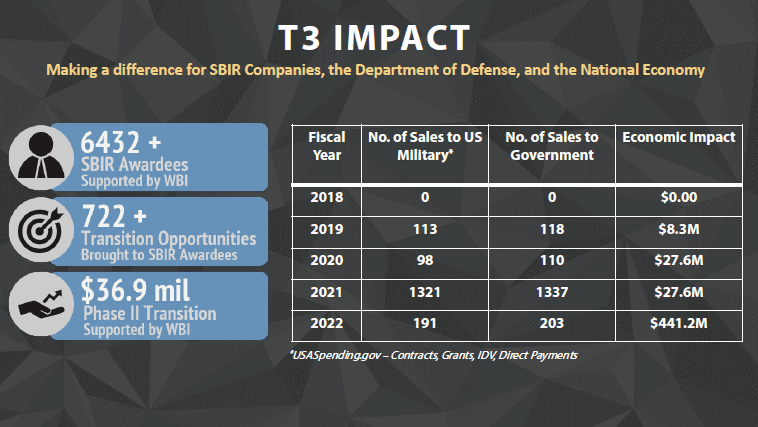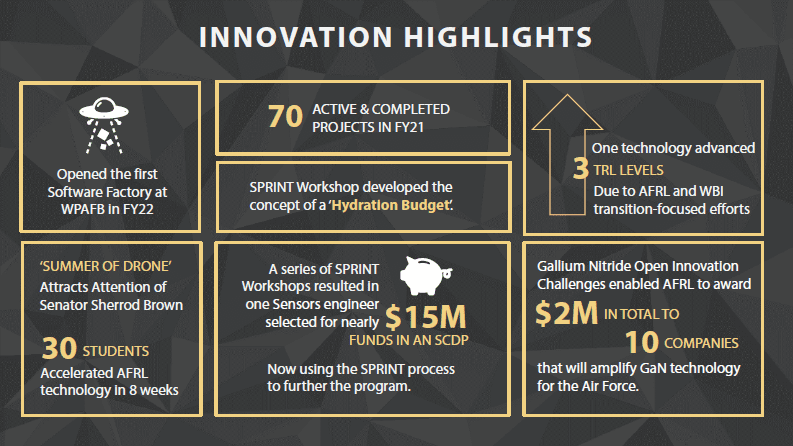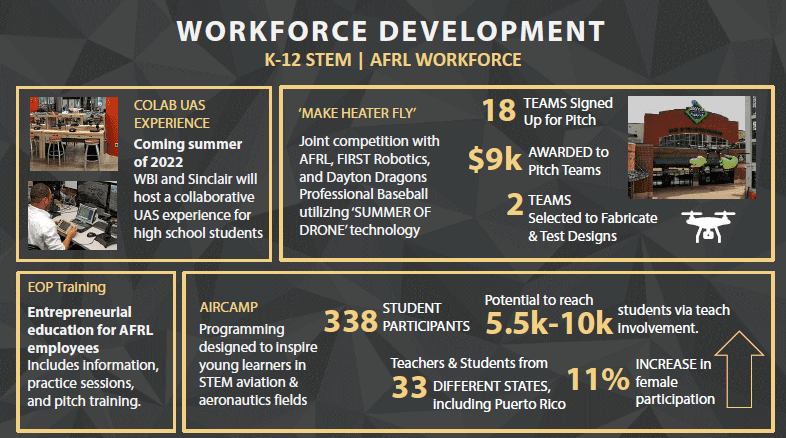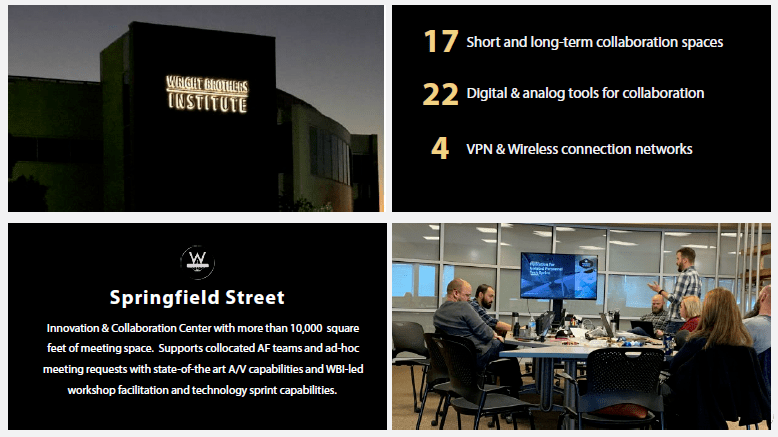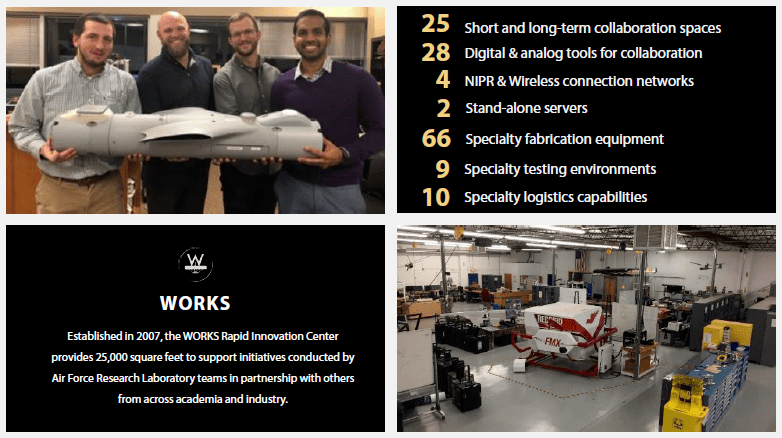2022 Year in Review
13.01.23 02:31 AM By Jennie Hempstead
Wright Brothers Institute spent 2022 forging ahead in service of our mission: accelerating collaborative innovation solutions for Air and Space Forces and other stakeholders by leveraging subject matter experts, collaborative environments, disruptive innovation processes, and partner networks.
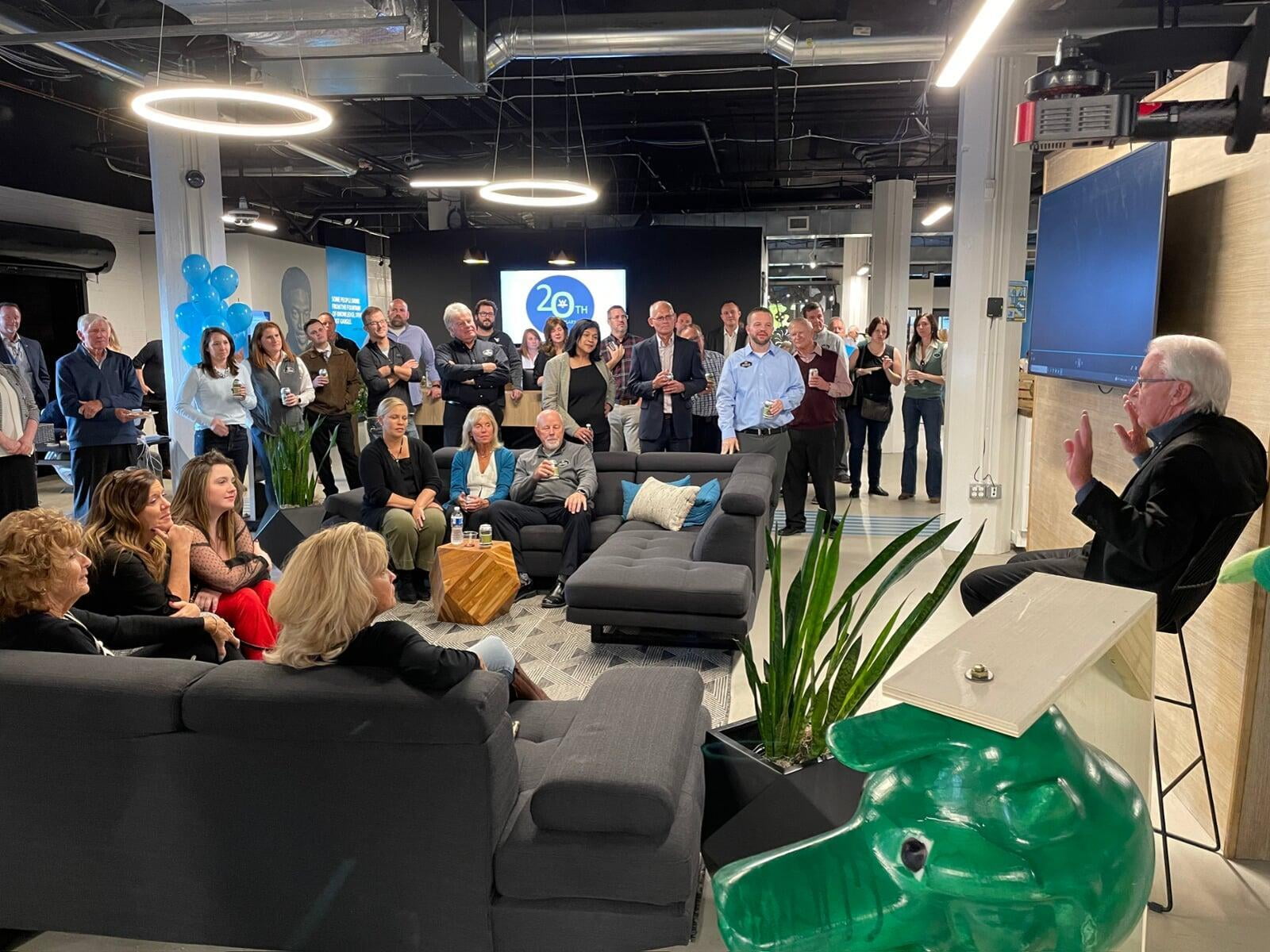
In addition to a year full of shoulder-to-shoulder work with the Air Force Research Lab spanning the globe, WBI celebrated its 20-year anniversary with an October party at which WBI’s success was on display as a reminder of the impressive work accomplished since its founding in 1982. Also present was Dr. Bart Barthelemy, one of WBI’s founders, whose attitude is as positive and inspirational today as it ever was.
Fiscal Year 2022 was brimming with program success in rapid innovation, SBIR support, to-the-point facilitation, new and non-traditional partnerships and cutting-edge collaboration. Please read on for information on some of the accomplishments of which we’re most proud.
TECHNOLOGY TRANSFER/TRANSITION
Support for the SBIR Ecosystem
The Challenge: WBI’s SBIR Ventures Team engaged early on with Legionarius LLC, a Massachusetts-based small business and inventor of a “smart garment” that could change battlefield operations to the great benefit of the warfighter. The company made use of the WBI team’s experience and expertise to navigate the government SBIR process, resulting in two SBIR funding awards. Securing this funding was vital to the company’s successful technology transition.
The Solution: Legionarius participated in SBIR Ventures’ SBIR TAP (Small Business Innovation Research Technology Acceleration Program), a product of WBI and the Entrepreneurs’ Center for SBIR awardees in partnership with AFRL. WBI’s SBIR Ventures team and SBIR TAP is fully funded by AFWERX Ventures. While attending SBIR TAP and with the dedicated guidance of WBI, Legionarius sharpened its value proposition, considered commercial and DoD business models, cultivated market research strategies and other useful start-up skills. The company leadership also made important connections with other SBIR-awarded small businesses, entrepreneurial mentors, and SBIR transition experts.
WBI Contribution: WBI’s comprehensive SBIR programs are invaluable to small businesses in navigating the government contracting world; WBI’s Transition Expert engaged with WBI’s Industry Outreach Program Manager to discuss collaboration possibilities between Legionarius and AFRL technologies complementary to Legionarius’ SBIR technology development goals. WBI works with the AFRL Office of Research and Technology Applications (ORTAs) to transfer Air Force-developed intellectual property (IP) to industry transition partners and bring AFRL technologies to market and into the hands of the warfighter. In March, Legionarius secured an Information Technology Agreement (ITA) with AFRL’s 711th Human Performance Wing. This ITA allows Legionarius access to data needed to develop and iterate on its SBIR-awarded technology.
Technology Transfer At-a-Glance
Technology Transfer At-a-Glance
WBI’s Technology Transfer and Transition team was instrumental in supporting several small businesses in government contracting efforts. More than 20 technologies progressed toward commercialization under WBI’s guidance. In addition, WBI consulted on marketing efforts and was instrumental in supporting myriad inventions and agreements while supporting 23 scientists from the Air Force Research Lab.
DIGITAL TRANSFORMATION
Hangar 18 – Midwest’s First Software Factory
Hangar 18 – Midwest’s First Software Factory
The Solution: Hangar 18, the first software factory at Wright-Patterson Air Force Base, accomplishes its mission by providing tools and tool pipelines, guiding technical efforts, and educating the workforce. Hangar 18 is located on the first floor of Wright Brothers Institute's 5000 Springfield Street facility, where it conveniently leverages the innovative and collaborative atmosphere that WBI brings to the mission.
WBI Contribution: WBI was brought onboard in 2017, when Matt Jacobsen, now Director of Hangar 18, developed HyperThought, described as a “federated solution that provides digital workspaces for collaboration, asset and resource management, visualization and analysis, and integrated search capabilities.” This became the foundation for what is today’s Software Factory. Jacobsen found a dedicated champion in WBI, which was instrumental in bringing the Software Factory model to Wright-Patterson, campaigning for the innovative concept even before Dr. Will Roper, then Assistant Secretary of the Air Force for Acquisition, Technology and Logistics, declared agile software, digital transformation and open architecture critical to the Air Force future. In November, Hangar 18 hosted its first Open House, attracting more than 65 people from AFRL, WBI, and local partners.
DEFIANCE Kickoff
The Challenge: The Department of Defense and the Air Force are dedicated to making digital acquisition an Air Force reality. The potential benefit is generally accepted and large-scale efforts and initiatives are under way, exploring the application of digital principles to most phases of the system lifecycle. Application of digital engineering principles to S&T offers the potential to significantly speed R&D programs by enabling better decisions and quicker execution; shrinking the timeline from S&T to full operating capability; and making it possible to establish a complete digital thread across the lifecycle.
The Solution: Previous digital engineering research efforts were successful in mapping activities and products used by S&T advanced development programs to those required by formal acquisition programs. A universal framework or model was developed, providing several best practices upon which this project will build. The framework incorporates rapid learning to experiment, prototype, then pivot to produce as much learning as possible within the timeframe. This rapid learning approach relies on collaboration and the ability to rapidly identify, connect to, and partner with other government agents, industry (including small businesses), and academic institutions to access the latest information on relevant subject matter.
WBI Contribution: This approach leverages WBI’s capabilities in planning and organizing Sprints; assembling and facilitating multidisciplinary teams of SMEs and stakeholders; and rapid innovation, prototyping and experimentation. WBI leveraged its Partnership Intermediary status, open collaboration spaces, market research capabilities, and formal and informal partnerships to identify, contact, and actively collaborate with traditional and non-traditional players. Through targeted experimentation and prototyping, this program will knock down any real or perceived barriers to success.
INNOVATION and COLLABORATIVE FACILITATION
711th Human Performance Wing Business Process Sprint
711th Human Performance Wing Business Process Sprint
The Challenge: AFRL’s 711th Human Performance Wing sought WBI’s expertise in devising an innovative solution to updating its software acquisition process. Scientists and engineers were hindered by the time and paperwork required to update software, and sought a business process that would allow more flexibility, free up the IT staff, and enable autonomous management of their own digital needs.
The Solution: WBI’s proven expertise in facilitating workshops and Tech Sprints was p
ut to work planning a three-day Sprint with the stated goal to develop “a plan that can be presented to leadership that is likely to succeed that can establish a proof of concept with Sprint funding.” Multiple perspectives and experienced, powerful facilitation methods were required to move the group to a single, actionable concept that could be presented and accepted by AFRL leadership.
WBI Contribution: WBI led the 711th in designing a three-day Sprint focused on mapping the problem space, brainstorming solutions, and developing actionable hypotheses. Miro, a software tool, was employed to capture the entire Sprint; participants were given space and time to voice frustrations; root causes of those frustrations were identified and addressed. Each stakeholder shared their process, allowing the group to recognize similarities and differences in organizational processes. Attention then turned to mapping the “Customer Journey,” with the customer being different positions in the AFRL workforce – e.g. help desk, S&E, intern, warfighter. Each software approval process affects each mission in different ways. This creative thinking led to several process improvement ideas.
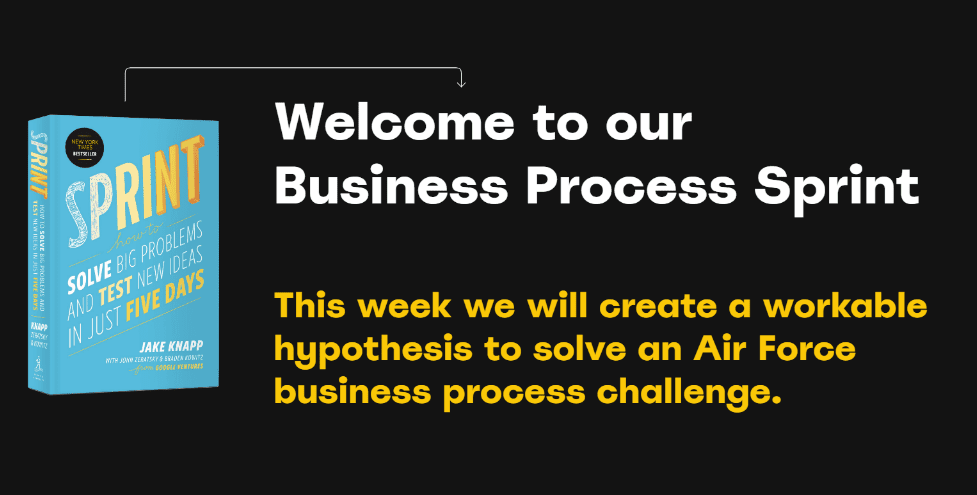
711th Human Performance Wing Airman Services Directorate Prioritization Facilitation
711th Human Performance Wing Airman Services Directorate Prioritization Facilitation
The Challenge: The 711HPW sought WBI’s direction in devising a workshop that would design and help implement a fair and equitable process with which to analyze research priorities in alignment with those of the greater Air Force. The participants sought this insight in preparation for a follow-on, top-level research initiative workshop that focused on the overarching biotechnology sector of RHB.
The Solution: The WBI-designed and facilitated workshops resulted in adoption of an innovative process that can be applied to future funding calls, making it simpler to decide which research ideas are most relevant, and who and what resources would be required to execute them. WBI also captured key elements of the discussion that were used to communicate the meeting results and inform leadership of the outcomes. (The final graphic as displayed in the online platform was converted to a poster, which currently hangs in the Performance Core Research Area Lead’s office, acting a reminder to ensure their research continues to align with what the Air Force finds most impactful for the mission and the warfighter.)
WBI Contribution: WBI’s unbiased point of view in designing and executing the workshop along proven lines of engagement was essential to the “racking and stacking” of research ideas and competencies. WBI’s experienced facilitator was able to navigate the group around possible conflict and through valuable brainstorming and prioritization exercises.
PARTNERSHIPS
WBI’s relationships with state and local governments, other non-profits, and state-funded universities broadens the economic impact of each entity on the region it serves, creating jobs and strengthening communities.
State and Local Agencies
In 2022, WBI’s commitment to working with state agencies and through agency-led programs saw steady growth and a renewed state-wide commitment to collaboration.
- Ohio Department of Development oversees and provides direct programing and funding to support entrepreneurs, small businesses, and minority-owned business in Ohio, supporting communities in growing their economies and promoting Ohio as a destination for visitors and entrepreneurs.
- Ohio’s Third Frontier Program operates under the Ohio Department of Development. WBI continues its support for its Entrepreneurial Services Provider Program; in 2022, WBI contributed to $459,171 in state funding to Dayton’s Entrepreneurs’ Center. WBI’s three-year commitment provides for $1.66M in Third Frontier grant funding, a direct positive effect on the Dayton region.
- Entrepreneurs’ Center: WBI and the EC cooperated to continue programming under the current FY2020-2022 Ohio Third Frontier award and developed inputs for a grant application to renew and extend programming support into 2025. If accepted, this would provide WBI Program Income via State of Ohio grant funding. Direct project outcomes and follow-on activities related to WBI’s enhancement to AFRL technology transfer efforts and WBI’s capacity to assist in bringing targeted technologies through the development process and into commercialization.
- Ohio Department of Higher Education oversees the public universities and colleges in Ohio, the state’s network of public universities, regional campuses, community colleges, and adult workforce and adult education centers. WBI works directly and indirectly through the state’s public universities and colleges to gain visibility for AFRL technology needs, generate collaborations in technology areas of interest to AFRL, and to pursue other areas of mutual interest.
- Ohio Federal Research Network (OFRN): Parallax Advanced Research (“Parallax”) operates the Ohio Federal Research Network. WBI attended OFRN research project reviews featuring primary investigators from The Ohio State University, Miami University, Kent State University, and others. Follow-on coordinated activities between Parallax and WBI are in the planning stage for FY23.
Universities & Academia
- Ohio University (OU): WBI and Ohio University collaborated on a number of efforts including a Digital Transformation proposal to the Miami Valley Regional Planning Commission, and explored additional grant and economic development opportunities. WBI also aligned with OU’s Russ Research Park and future digital studio software design and testing capabilities.
- In association with its memorandum of understanding (MOU) with OU, WBI and OU co-developed Collider outreach programming featuring the Procurement Technical Assistance Center (PTAC) program and its mission to help Ohio's businesses seeking to compete for federal, state, and local government contracts. Additional PTAC events and collaborations are slated for FY23.
- Miami University (MU): WBI and Miami University entered into a five-year MOU that provides opportunities for collaborative tech transfer, grant and economic development opportunities. WBI is recognized as one of MU’s key collaborators for the university’s College@Elm initiative, which will provide AFRL with access to a number of T2/T3 partnerships.
- Wright State University (WSU): WBI met with leadership of the Wright State University Foundation to examine collaborative opportunities around the Foundation’s intent to stand up a 5G innovation lab. This program would draw upon state and local funding sources and partners from both the public and private sector. Dialog is ongoing.
- Sinclair Community College (SCC): WBI and SCC announced a plan to collaborate on a STEM pilot program for Dayton-area high school students. The program, “CoLab,” featured unmanned aerial systems (UAS) technology, exposing rising sophomores, juniors, seniors and area educators to UAS technology and career-related platforms of interest to AFRL. The curricula and program were codeveloped and offered with support from SCC’s National UAS Training and Certification Center, the Dayton STEM Center, the City of Dayton, CO-OP Dayton, the Westside Makerspace, and others. The camp ran in FY22’s third quarter.
- In addition, WBI partnered with the Air Force and Sinclair to host “Air Force Digital Engineering and Transformation, A Conversation with the DAF Digital Transformation Office” Collider. This event helped prepare small businesses to work on Digital Transformation efforts, while providing additional information about Sinclair’s UAS capabilities. WBI also participated in developing a UAS-themed Collider that attracted 212 attendees, increasing the awareness and attractiveness of these efforts to the small business ecosystem.
- Lake Erie College (LEC): Lake Erie College and WBI executed a five-year MOU as an expression of their shared, vested interest in advancing scientific research and development and expanding the transfer and transition of intellectual property and technology developed within, or in partnership with, federal laboratories and other entities across public or private sectors. The MOU exposes LEC capabilities and expertise to AFRL and vice versa - advancing basic and applied research efforts being conducted via AFRL. Further, this MOU communicates LEC's desire to foster the growth of healthy innovation ecosystems and communities within the state of Ohio in part through the promotion of STEM disciplines and programs to attract, inspire, and develop the current and future workforce. LEC has committed to jointly develop, promote, and deliver STEM curricula and event programming that advances AFRL opportunities to inform, educate, and train audiences of mutual interest no less than one time per calendar year. Preliminary programming is envisioned to support upwards of 150 students being trained and supported with Air Force STEM curricula over the five-year period. This MOU has allowed WBI and LEC to begin coordinating with WPAFB STEM offices for development of a STEM camp during CY23-27, beginning with approximately 30 students in 2023 and further connecting AFRL to new partners and collaborators in the desirable and diverse Northern Ohio region.
- Case Western Reserve University (CWRU): WBI established a five-year MOU with CWRU to support the advancement of opportunities to "spin-out" and "spin-in" technologies for the Air Force, as well as nurture scientific research and development opportunities. Backed by the expertise of CWRU as an R1 research institution, the partnership lays the groundwork for leveraging CWRU’s infrastructure contained within their think[box] facility. Programs that are envisioned to mature from the MOU will directly support the AFRL/SB T3 program office by presenting AFRL intellectual property licensing opportunities to commercial early-stage ventures and other private industry representatives.
Partnerships With Other State, Federal Organizations
WBI seeks to identify potential opportunities for partnerships with state and federal organizations that enhance AFRL's ability to bring experts from each organization together in a forum or other venue to explore possible joint programs, meet strategic objectives, or pursue near-term collaborative research and development initiatives, among other various activities or outcomes. Additionally, WBI supports local government priorities and programs in alignment with guidance provided by the department of the Air Force and AFRL concerning partnership intermediaries.
- Northern Kentucky University (NKU): NKU and WBI entered into an MOU that reflects their common interest in the advancement of a thriving innovation ecosystem within the Midwestern/Southern regions of the United States. Further, both NKU and WBI desire to promote scientific research and development and expand the transfer and commercialization of technology developed within, or in partnership with, federal laboratories, universities, and other entities across the public or private sector.
- Mississippi State University (MSU): WBI and MSU entered into a non-disclosure agreement to exchange information and explore collaborative opportunities associated with Unmanned Aircraft Systems research. MSU runs the Federal Aviation Administration’s Alliance for System Safety of UAS through Research Excellence (ASSURE) program. ASSURE is comprised of 24 (16 core & 8 affiliate) of the world’s leading research institutions and more than 100 leading industry and government partners. ASSURE members are core to three FAA UAS test sites, lead four FAA research centers, have seven airfields and a 340 UAS fleet — 24 more UAS than the USAF. Ohio-based Sinclair Community College and The Ohio State University are core members.
- City of Dayton, Ohio: The City of Dayton adopted a resolution endorsing WBI’s critical role in fostering economic development between the Air Force and the City on October 6, 2021. Community collaborations, such as the Westside Maker Space, enable relationships between the Air Force and disadvantaged businesses in the small business ecosystem and will be sought in FY23.
- City of Riverside, Ohio: WBI received formal recognition from the City of Riverside Council and its nexus-qualifying relationship via the passing of Resolution 22-R-2781. WBI developed the curricula and content for the group’s strategic planning discussion, hosting and conducting the workshop. This workshop is one of two planned, with the second in FY23. The culmination of activities across both workshops will inform a final report and content for shaping the City of Riverside’s updated strategic plan.
STEM OUTREACH and WORKFORCE DEVELOPMENT
“Make Heater Fly!”
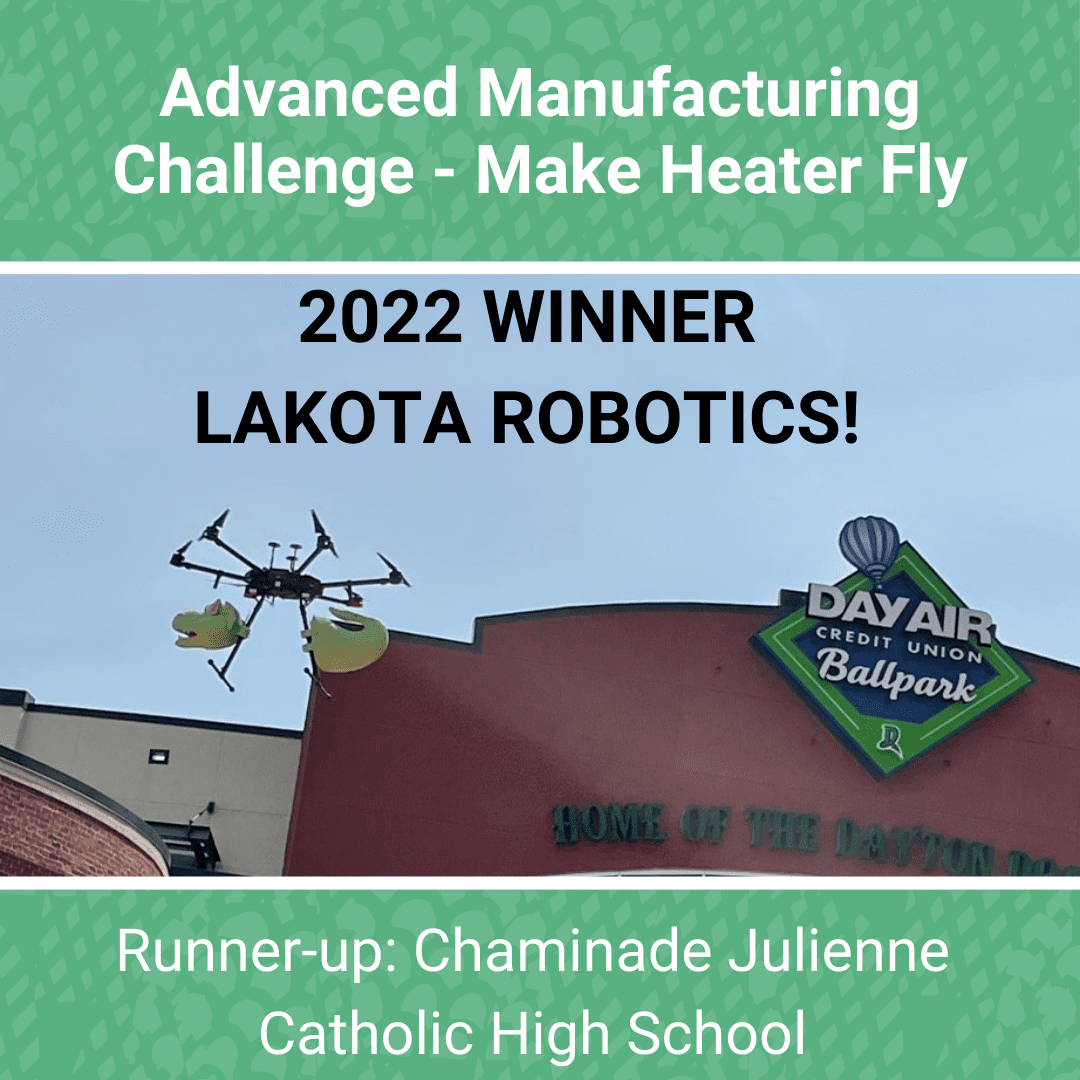
The Challenge: In 2019, AFRL and the Air Force Rapid Sustainment Office were tasked with conducting a series of additive manufacturing innovation challenges, branded the Advanced Manufacturing Olympics (AMO). WBI partnered with AFRL to organize the AMO as a virtual event that was held in October 2020. The AMO sought to bring recognition to Air Force innovation in advanced manufacturing and to provide a forum for advanced manufacturing training, exposure opportunities in seminars and panels with technology leaders in government and industry.
The Solution: Building on the success of the AMO, AFRL applied leftover funding from that challenge in furtherance of its mandate to assist in STEM education. WBI was enlisted to devise a follow-on challenge (“Make Heater Fly!”), teaming with FIRST Robotics and AFRL in a successful and wildly original STEM event. The challenge was to make Heater, the mascot for Dayton, Ohio’s minor-league baseball team, “fly” by designing and fabricating a version of Heater onto an off-the-shelf drone.
WBI Contribution: WBI brainstormed with FIRST Robotics and AFRL to design the challenge, which was creative, unusual and Dayton-centric. WBI arranged for schools to be notified – all schools in Ohio were eligible. WBI recruited and hosted the design presentation and final competition. The challenge increased awareness of real-world concerns and focus areas for advanced manufacturing; young, talented engineering students could apply these skills to an Air Force career they may not have considered or been aware of. Not incidentally, it was a fun challenge for the teams and WBI!
Air Camp
The Challenge: AFRL engaged WBI to partner with Dayton-based Air Camp Inc. to develop and execute STEM camps for interested students across the nation. Since 2011, Air Camp has implemented STEM programs designed to build skills in leadership, scholarship and citizenship. Air Camp actively collaborates with area professionals, teachers and students to provide relevant STEM content and hands-on engineering challenges and depends on WBI’s financial and content support as essential to fulfilling its mission. The focus on STEM is vital to our Air Force future: data included in the Air Force Science and Technology Strategy 2030 showed that the Air Force had reached its lowest numbers for science, technology, engineering and math in its general officers in more than 30 years.
The Solution: With WBI’s involvement, one 1-day camp was held for elementary-age students (grades 4,5 and 6), four 1-day camps were held for middle-school students (grades 7, 8 and 9); two 2-day camps were available to high school students (grades 10, 11 and 12); and one 1-day camp was held for teachers of students in grades K-12. An important facet of Air Camp is its commitment to engaging diverse learners and teachers, especially students from underserved populations in STEM fields. In 2022, there were 312 participants (104 female, 208 males) across different camp experiences, with 28 percent reporting themselves to be of minority status.
WBI Contribution: WBI was an active partner in planning, designing, recruiting and executing 2022’s camp experiences. In addition, WBI was engaged in March 2021 to establish a pilot program to develop and execute a mobile version of Air Camp for use by the Air Force Materiel Command (AFMC). The pilot was initiated in the Wright-Patterson AFB area with the goal of expanding the program across AFMC bases. WBI was crucial to this effort, acting as the bridge between local, regional and national educational entities, AFRL, and Air Camp, in addition to managing the budget and providing summary metrics and reports to all stakeholders.
AFRL Sensors Directorate “Beyond 5G Challenge, Part 2”

The Challenge: WBI and AFRL again collaborated on Year 4 of the Sensors Directorate’s “Beyond 5G Challenge.” This year drew a record 18 university teams from across the U.S. and, for the first time, Canada. This unique university competition is designed to provide up-and-coming engineers with valuable hands-on experience in cutting-edge technology deemed pivotal to the Air Force future. These challenges seek students – both undergraduate and graduate – to delve into the potential of Software Defined Radio (SDR) kits provided by WBI. SDRs offer an ideal platform to explore a host of communication, sensing and networking applications and create hardware instantiation of highly adaptive and reconfigurable, software-controlled radio frequency applications. The ability to adapt and reconfigure radio frequency channel performance is critical to future military and commercial applications: system architects, programmers and application engineers with SDR programming and application skills will be in high demand.
The Solution: The challenge allowed students to gain insight into a possible government career path while applying innovation and imagination in a team environment. This challenge ran through the entire 2021-2022 academic year and culminated with top-selected teams demonstrating their design at an in-person showcase event in late April 2022 in Dayton, Ohio. More than $14K in cash prizes was awarded during this three-day showcase.
WBI Contribution: WBI helped guide the process beginning to end, starting with publicizing the challenge and culminating with the eventual down-select process that resulted in eight teams being invited to Dayton to showcase their projects. WBI designed the challenge; promoted it via connections in industry and academia; managed the entries; managed all travel requirements for the eight teams (3+ members each); hosted the in-person final showcase; and ensured prize payout totaling $16K was processed ($5K to two winning teams; $2K to three travel grant recipients).
PROTOTYPE SUPPORT
711th Human Performance Wing / Airman Systems Directorate - Innovations in Airman Sensing & Assessment: Hydration for Isolated Personnel
The Challenge: Isolated personnel are largely dependent on emergency packs and/or unfamiliar environments for adequate hydration, often a key to survival. AFRL’s 711 HPW engaged WBI to explore innovative solutions.
The Solution: WBI facilitated the assessment of forward osmosis technology, ultimately uncovering a discrepancy in the manufacturing process – a costly, time-consuming and performance-damaging issue should the Air Force adopt it. WBI and AFRL were champions in introducing this technology into the seat kit modernization effort within AFLCMC’s Human Services Division. Field evaluations and warfighter feedback in a warfighter training facility has provided vast amounts of information for AFRL’s 711HPW/RH and the WBI team, helping WBI connect AFRL to the right partners and collaborators.
WBI Contribution: WBI facilitated introduction of the hydration small business to another Dayton-local small business and facilitated shipment of two pallets of hydration filters in support of the Ukrainian fighters overseas. WBI’s Rapid Innovation Team explored the innovation landscape specific to technologies related to evaluating the bioeffects of flight, teaming with 711HPW/RHXJ to demonstrate the fundamental concepts of these innovations. WBI and AFRL socialized and demonstrated advanced water capture, filtering, hydration techniques and products during the exercise. Of particular note was the use of the Seal Forward Osmosis Pack from Fluid Technology Solutions, which was identified during a Tech Sprint. WBI has connected this organization to the Air Force for use, evaluation, consideration and deployment into select survival seat kits. The technology allows for a wide variety of questionable, but available, water sources to be used for hydration. This effort builds upon the Liquid Cooled Plate Carrier project, now “Acclimate,” a device that reduces heat injury in training and deployed environments while improving performance and comfort. The device was tested at Nellis AFB, Nevada, with end user feedback collected and evaluated. WBI assisted in the conceptual development, market survey, and commercial evaluation.
Air Force Jungle Boot
The Challenge: Airmen deployed to jungle environments know the misery brought on by prolonged wet feet. Trench foot has long plagued the military, often requiring removal of a warfighter for adequate treatment of the painful condition. Amazingly, treatment and prevention of trench foot is still lagging, leading the Air Force Research Lab’s Junior Force Warfighter Operations (JFWORX) to undertake the Air Force Agile Jungle Boot project. JFWORX turned to Wright Brothers Institute for assistance in rapid innovation and commercial transition of new footwear designed specifically for jungle operations. The goal was to design footwear that would rapidly drain while not absorbing water – no completely waterproof boots exist on any market. In FY22, the Army released its version of a jungle boot, found to fail Air Force requirements because of polypropylene fibers such as nylon woven into its design.
The Solution: WBI identified Rocky Boots of Nelsonville, Ohio, as a commercial boot company with the required capabilities, and worked with JFWORX and Rocky Boots to refine a design sample that was launched at a national conference early in 2022.
WBI Contribution: The WBO Rapid Innovation Team’s product/market analysis, concept development services, and ability to identify collaboration partners allowed for the creation of a jungle boot that could change the face of waterproof boots in military environments and commercial forums. WBI’s industry partner, Rocky Boots, is widely known for its outdoor boots and contributes a level of trust and customer following that will accelerate potential technology transfer/transition. Anticipated outcomes include faster acquisition for military use to meet mission-critical equipment needs and risk reduction for large-scale equipment purchases.
FACILITIES

